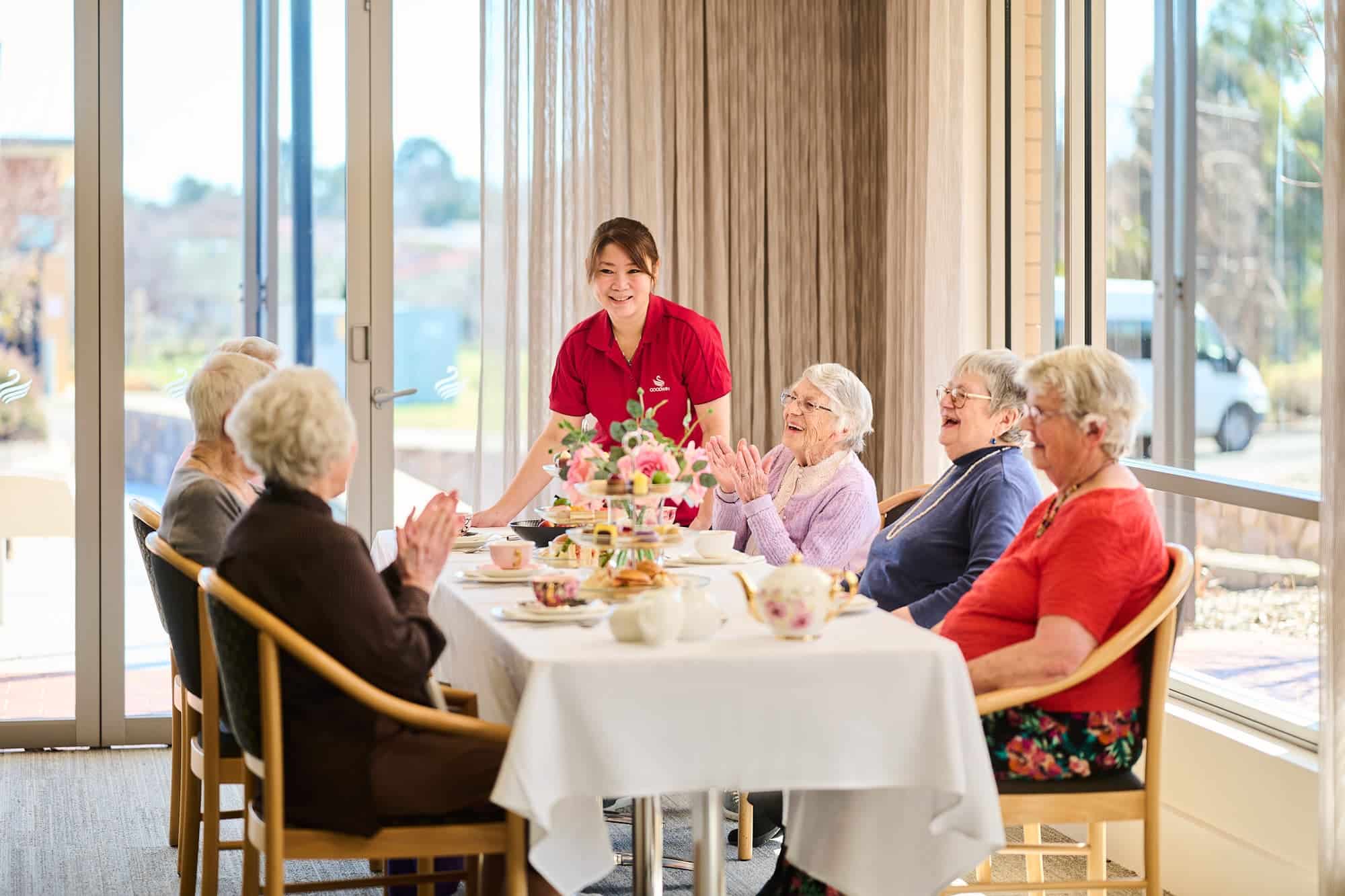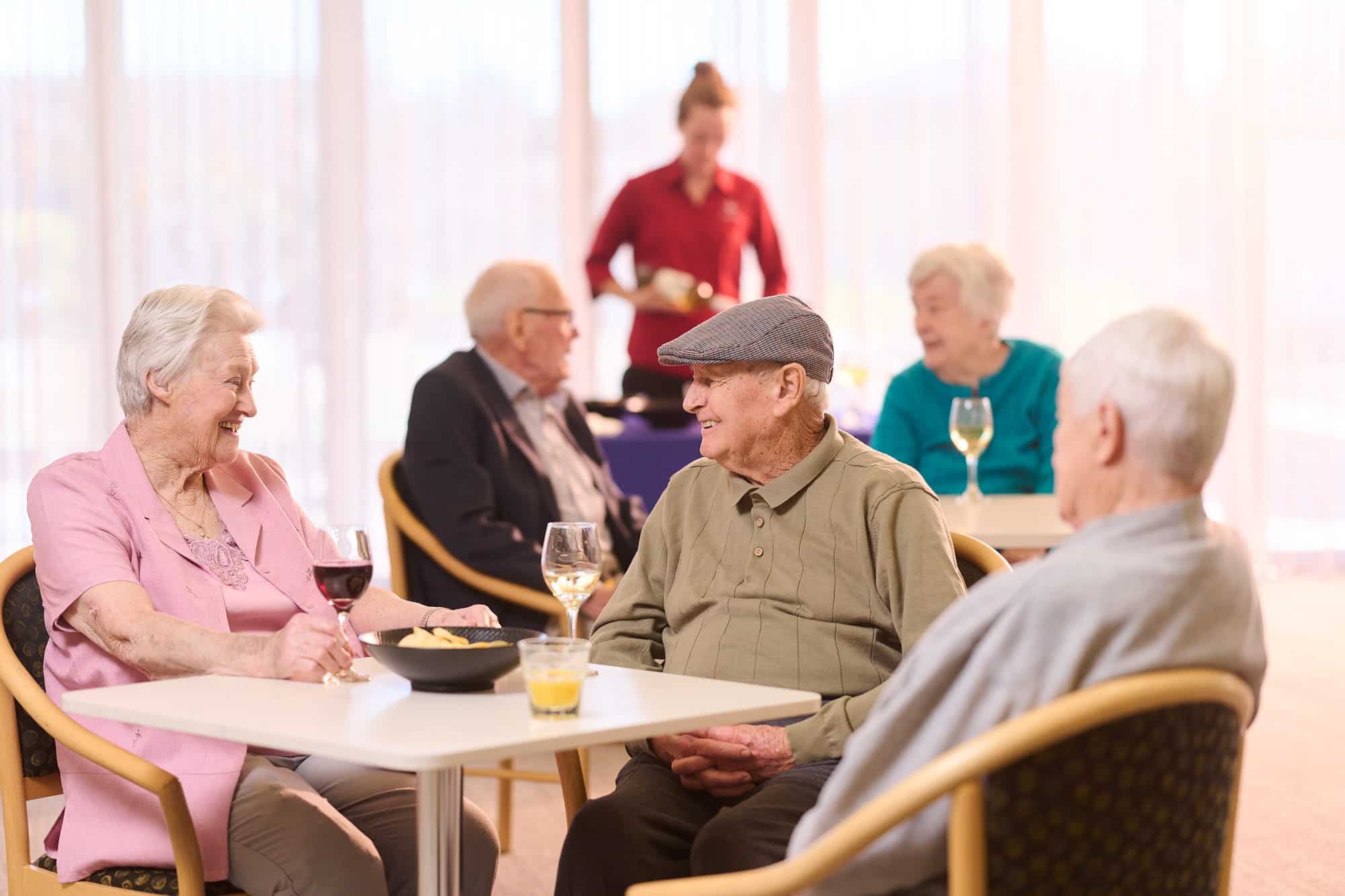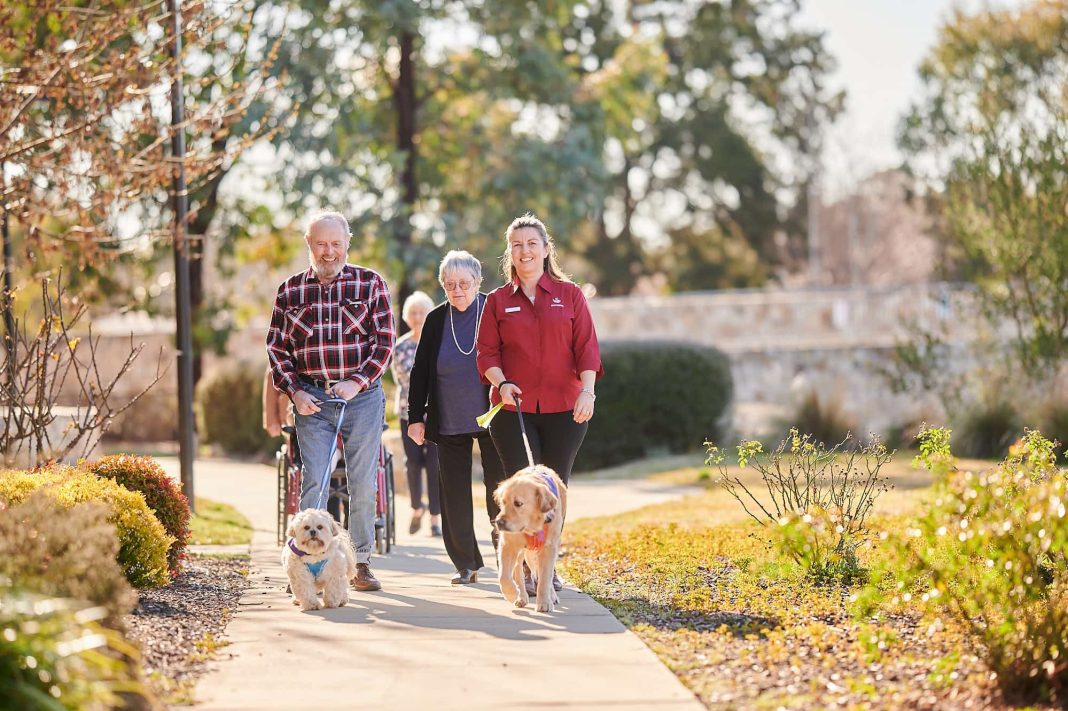Abbie Dawson, qualified diversional therapist and Leisure and Lifestyle Manager with Goodwin Aged Care Services in Canberra, talks about her job and why she’s passionate about improving the lives of residents.
Q. How would you describe your role?
Abbey: I’m the leisure and lifestyle manager at Goodwin and lead the teams of leisure and lifestyle staff within the homes. These teams consist of a coordinator and officers who facilitate activities throughout the day to our residents on site. We offer a range of different types of activities, which could be social, cultural, physical, sensory, social activities.
I’m also a qualified diversional therapist, so I look at the benefits each activity has and how they meet the needs of our residents. Often, what I am trying implement in our homes are things that give our residents a sense of community and belonging, giving them purpose by having tasks to do, the sorts of things they might do in their own house. So, for some residents, it could be things like helping set the table, sweeping the floor, cooking meals; we have a resident-run shop at each site. It gives our residents something to do that helps them also serve the community they’re living with; it gives people meaning to give back to others. A lot of our residents like to talk about how we do so much for them, they’d like to give back to us.
So, my role is to guide the team that runs the fun stuff at the home, but also look deeper into how else can we get more engagement and purpose for the residents living here.
Q. Do the activities on offer vary across the different locations?
Abbey: Activities are really tailored to the residents, so there are different activities happening based on what the residents of each specific location prefer. There are also lifestyle teams at the independent retirement living villages, which offers separate programs and activities. In George Sautelle House in Farrer, they’re very welcoming in joining in. We have residents in residential care who are quite crafty or arty, who go to the retirement living paint and sip classes or their weekly Wednesday knitting groups and things. So, for residents who do require that little bit of extra stimulation, they can just go next door to the retirement living village and participate in their activities as well, and vice versa. We have volunteers from next door who come across and support our services. Just last month, a choir came in to see when they could start a singing group or performances here on site.
While we’re different teams that run the program of activities, we’re quite flexible in sharing resources and areas. For example, while their café is their café, our residents can also go in and out as freely as they like.
Q. How long have you worked at Goodwin?
Abbey: I worked with Goodwin for about five years as an activities coordinator at Goodwin House in Ainslie, then, when I got my degree, I worked at Dementia Australia for two years and learnt some other things. Now I’ve come back as the Leisure and Lifestyle Manager here at Goodwin and have been here for around a year.


Q. What does leisure and lifestyle mean to you in the residential aged care context?
Abbey: I am quite passionate about leisure and lifestyle and got a degree in it. For me, it’s not just about activities and fun; it’s also about having that sense of identity and belonging to the home. I feel that it’s leisure and lifestyle that breaks the perceived stigma and culture around residential aged care. So, part of our team’s role is to make sure people realise this isn’t the sort of place you walk into where suddenly everyone does everything for you. It’s about educating and informing staff about how to change their practices a little bit to meet the leisure and lifestyle needs of residents, not just the clinical needs, which helps make sure that people’s cultural identities, their experiences, their pasts, their stories, are celebrated within the home. So, we celebrate Easter, Mother’s Day, New Zealand’s Waitangi Day, Chinese New Year, we celebrate all the different nationalities. If we have Indian residents, we celebrate their national holidays. We then encourage those residents to tell stories about their experiences, knowledge, customs or beliefs, so that they’re sharing their experiences with others.
For us, lifestyle isn’t just always like a cruise ship – we run activities, and they play trivia and bingo and good stuff; it’s also about creating an environment they love to be in.
Q. What are your main priorities as Leisure and Lifestyle Manager at Goodwin?
Abbey: One of my main priorities is upskilling staff and sharing knowledge, letting staff know that if someone’s sitting down having a cup of tea, you can go and sit down, have a cup of tea with them. So it’s mostly about softening the environment for our residents. If you’re sitting down engaging with someone, that’s actually your role, not just having to always be working on the documentation and communicating on computers.
I think one of the things we do really well here is ensuring there’s collaboration with residents. We are the team who gets to find out the really cool stories of people’s pasts, who talk with our residents about their occupation, their hobbies, their interests, their stories. For me, it’s ensuring we share that with the different departments, which is one of the best things about residential care; you have so many different departments that you can work with closely and have that sort of interdisciplinary teamwork to create that holistic care for the residents.
So sharing and upskilling staff’s knowledge is a big one for me. Then that naturally gives people a better lifestyle within the home, because when we know, for instance, you like playing sport, you’re a big sports fan, and this is your favourite AFL team, we can switch over to the AFL channels. Sometimes it’s the small things, making sure all the small things count.
My other main priority is continuous improvement in activities facilitated on site, ensuring they’re targeted at the range of the residents’ abilities, and that they’re getting more than just engagement out of it. There could be a sense of learning entwined in the activity, a sense of social engagement, or of being able to communicate and talk, to de-stress or unwind. It’s about making sure the activities aren’t just there to be done.
For some people, large group activities isn’t their forte. And if you’ve lived at home by yourself and you’ve had carers come in to support you, suddenly going somewhere where you’re living with 20 people and having to go to activities with that many people is confronting, We don’t force people to go to these things; it’s just an invitation that we open warmly. And then, if they decline, it’s about how can we get them to the stage where they are able to participate? And how do we make those activities suitable for that person, as well as meet the people who do thrive off large group activities? So, it’s making sure we offer a range of activities to meet everyone’s needs, including people who have speech impairments, or cognition impairments, or hearing impairments. How can we facilitate this activity and have a good outcome for everyone?
If you think about wellness, meditation, those sorts of aspects, the more layers and senses you involve in an activity, the more a person is going to get from it. Sensory refers to things like cooking, smelling, touching – things that allow a person to feel human. Often things like baking, where you’re kneading the dough, you’re tasting the food, you’re smelling the food, allow you to realise more therapeutic benefits out of it, rather than just sitting there and talking, because you’re involving so many of your senses.
Q. What do you think makes George Sautelle House special?
Abbey: I think the environment that surrounds it is really amazing. You’ve got beautiful views of Mount Taylor, Isaacs Ridge and the valley. And then within the home, because of the way the building is so well designed, it makes you feel quite special and important to live here.
We’ve been lucky because we’ve been able to bring staff across from our other homes who have knowledge and experience with Goodwin’s values and traditions and know the residents inside and out. They’ve come across with some of the residents who live here. As well as experienced staff, we’re bringing in some fresh new faces who can bring in some cool new ideas. So, while it’s a new home with new facilities and we’re still building up our occupancy, we still have that breadth of knowledge backed up by Goodwin’s established policies and procedures that have proven to work over the years.
Q. What are your favourite leisure and lifestyle activities on offer at George Sautelle House?
Abbey: We do virtual reality 3D travel adventures; using the virtual reality goggles, our residents get to travel to different countries and have different experiences. We have a pet therapy program where our Goodwin dog, Zoe, lives on site. She is a golden retriever, very gentle and young, but a very old soul.
The pet therapy and virtual reality are our residents’ favourite things, and we also go on outings. We have our own bus that we can take residents out on, so we can go out into the community. Unfortunately, we can’t dabble in the whole schools, preschools and children’s aspects because of COVID rules, but I’m a huge believer that we’ll bring this in when possible. That’s probably the one we’re most looking forward to.
Q. Are there any specific facilities you want to mention that support your leisure and lifestyle activities?
Abbey: We have a functional gym and our physiotherapist on site, as well as physio aid, so we have that allied health aspect. We have an outdoor garden, a theatre room with a drop-down projector, a spa, a large entertaining and activities area, a Men’s Shed, a café, and a hairdresser on site. We have a podiatrist who comes in and visits as well as other allied health staff too.
Q. What’s been the most popular facility?
Abbey: We call it the ‘bits and bobs’ shop, which gives our residents independence to go shopping. Two residents run the shop, collect the money, do the stocktake, set up the shop up and close it. Our residents often love going ‘well, I want this for next week’ and it gives us ideas of what to purchase, or they sell us out within the first two minutes of opening. And the money, which is only like an extra 50 cents or $1 on products, that profit goes back towards the residents, such as if they want special entertainment or to go out for a Chinese meal.
Q. What do you think sets Goodwin apart?
Abbey: We’re a large organisation, but not too large. We’re large in the sense there’s a pool of people who we draw on and utilise their expertise and knowledge. We’re not just an aged care home that just looks after aged care; we have our own podiatrists, our own pharmacists, diversional therapists, dietitians. We don’t outsource much at all, and we can utilise our internal resources very effectively.
We strive for a high standard. And we are a company that makes sure we get to know our residents, and all our managers are quite client-facing and know our residents really well and their families. We know that communication with families is vital, especially throughout COVID times. So, we set up Teams meetings with families, ensuring they got the chance to get feedback and hear information about their loved ones while they couldn’t actively come in and see them. I think we’re quite innovative in making sure the programs we run are up to date and communicating that to our residents, their families, and staff.
Q. What is the highlight of your career so far?
Abbey: My passion is people living with a diagnosis of dementia. For me, it’s about seeing moments that reward them, the small tasks that you do, where you can see in their eyes and their smile and their body language … that recognition that can allow someone who may have been feeling lost to suddenly feel really secure. Those little moments in their day that they suddenly feel really important will be really special. And it’s just making sure you’re building that relationship. Often, it’s just spending a little bit of time holding their hand, and it’s amazing, you actually see their stress level decrease, and you see them look at you and go ‘thank you’ without having to explain what happened to anyone else. It gives you warm and fuzzy feelings to see them connect back with you. And they are still the person they’ve always been.
For more information, visit goodwin.org.au or call 6175 5100.
For more information on sponsored partnerships, click here.



